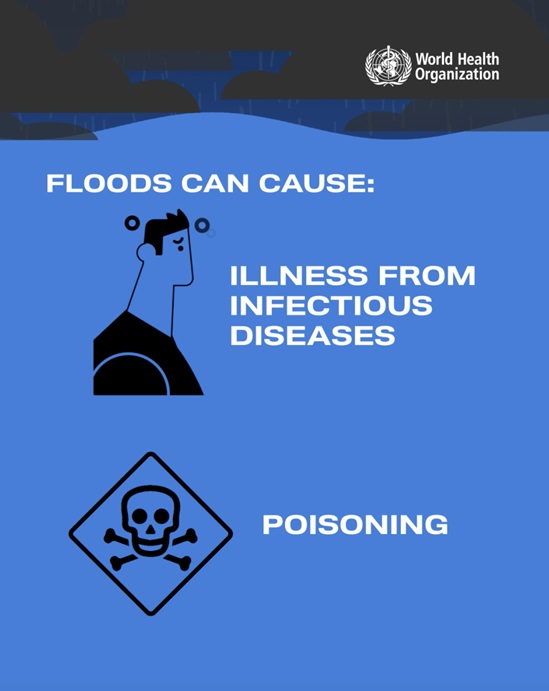
Health in Climate Change Talks
WHO’s role in mainstreaming health in the global environmental agenda
As the specialized health agency of the UN, WHO has a unique role in providing leadership, evidence-based advocacy, policy and technical guidance on health issues to its 194 Member States. WHO brings health perspectives, evidence and voices to multilateral
environment and sustainable development mechanisms to enhance their implementation and strengthen interlinkages between global health and environmental policies. WHO participates in leading global forums, such as the United Nations Framework Convention
on Climate Change (UNFCCC), Convention on Biological Diversity (CBD), the G7, and the G20, among others.
WHO has a long-standing programme on climate change and health, which has developed over 25 years, the mission of which is:
“To provide international leadership of a comprehensive health response to climate change, which enhances population resilience to climate risks, and supports health-promoting climate change mitigation policies; through advocacy, developing partnerships, assessing evidence, and strengthening the capacity of health and related systems in Member States.“
The programme supports the health dimension of the implementation of the 2015 Paris Agreement on climate change. WHO highlights the reference in the Agreement that countries should take account of the human right to health in implementing all actions
on climate change. Further, the WHO strongly supports countries to address the adverse effects of climate change on health (UNFCCC Article 1). WHO emphasizes the importance of country commitments to develop and elaborate appropriate and integrated
plans including on water resources and agriculture, and commitment to account for climate change considerations in social, economic and environmental policies and actions to minimize adverse effects on the economy, public health and the environment
(UNFCCC Article 4.1).
Human health should be part of an integrated mitigation and adaptation agenda across all sectors, with a focus on co-benefits for sustainable development.
Key focus of WHO's activities
WHO is working on empowering, informing and supporting government representatives, policy makers, and civil society actors to integrate health, in the lead up to and during international fora through:
- online learning materials, such as the “Climate Change Negotiations and Health” online course created jointly with UNITAR;
- civil-society partnership with leading health and climate institutions and organizations to collaborate on “near real time” review of draft negotiation documents and provide evidence-based input that strengthens and reflects the health dimension;
- supporting the participation of Ministers of Health and other health policy makers at international climate negotiations;
- showcasing health community engagement at UNFCCC Conferences of Parties (COPs) and other venues by:
⇒ sponsoring Health Pavilion at COPs, based on the successful experience of COP26;
⇒ organising global and regional climate and health conferences and consultations with key experts;
⇒ promoting interministerial dialogue on climate change and health at regional and country levels;
⇒ promoting inclusion of health content into NDCs directly through health sector channels;
⇒ supporting participation of health sector actors at international climate fora, including Ministers of Health and health policy makers; and
⇒ producing Special reports on climate change and health, outlining key health messages and case studies for the COP Presidency’s priority action areas.
World Health Organization has also joined nearly 200 health organizations, and 1400+ health workers to call for a Fossil Fuel Non-Proliferation Treaty.
Global Conferences on Health and Climate Change
Every two years, WHO organizes dedicated Global Conferences on Health and Climate Change at the margin of COPs. More details on the past Conferences are available here.
WHO Statements and Submissions
International Court of Justice (ICJ) hearings on the request for an advisory opinion on the Obligations of States in respect of Climate Change
UNFCCC Global Goal on Adaptation
Health Community Joint Submission, 5 September 2022
UNFCCC SB60 (June 2024)
Statement by WHO at the Global Stocktake (GST) Annual Dialogue, 6-7 June 2024
UNFCCC SB58 (June 2023)
Statement by WHO at GST Closing Plenary of SB58
UNFCCC First Global Stocktake (GST)
First annual global stocktake dialogue. Summary report by the secretariat, October 2024
Health Community Joint Submission - 2nd Round of Input, August 2022
Sharm el-Sheikh joint work on implementation of climate action on agriculture and food security
UNFCCC SB56 (June 2022)
WHO General Submission for SB56
Health Community Statement - Global Stocktake Opening Plenary
Health Community Joint Statement - Mitigation Work Programme
Health Community Joint Statement - Global Stocktake Roundtable 2 (Adaptation)
IPCC AR6
WHO Policy Brief: Review of IPCC Evidence 2022: Climate Change, Health, and Wellbeing
WHO COP27 Science-Policy Brief Series
Read more
COP26 special report on climate change and health: the health argument for climate action
The 10 recommendations in the COP26 Special Report on Climate Change and Health propose a set of priority actions from the global health community to governments...
COP24 special report: health and climate change
This report is a contribution from the public health community to support the negotiations of the United Nations Framework Convention on Climate Change...
Training health professionals
WHO works on developing capacity-building resources and activities on climate change and health for government representatives, policy makers, and civil society actors, in the lead up to and during international fora:
- WHO-UNITAR online course "Climate Change Negotiations and Health"
Related news
All →Infographics






